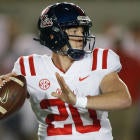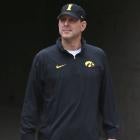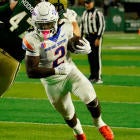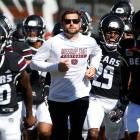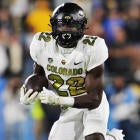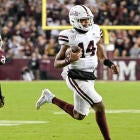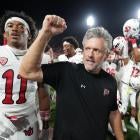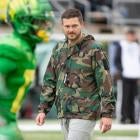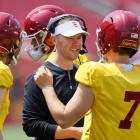The attorney for future Michigan quarterback Shea Patterson told CBS Sports he will not sue the NCAA to gain immediate eligibility for his client.
That is significant because attorney Tom Mars is largely why Ole Miss players' transfer status is in question in the first place. It was Mars who represented former Ole Miss coach Houston Nutt in his suit alleging school officials violated a separation agreement by making disparaging comments about the coach.
"I've never even had a private thought about suing the NCAA and have never said or suggested that to anyone," Mars told CBS Sports. "I have no idea who makes up this garbage."
Patterson, who passed for 2,259 yards and 17 touchdowns to nine interceptions this season, announced via Twitter on Dec. 11 he has decided to transfer to Michigan.
— Shea Patterson (@SheaPatterson_1) December 11, 2017
Mars says he hopes to have Patterson's waiver request to play immediately approved "as soon as possible." Most likely, the process won't be wrapped up until late January or early February, he said. The Detroit News reported Friday that Patterson will likely have to wait until early next year to find out about his request. Classes begin at Michigan on Jan. 3, 2018.
Several Ole Miss players have sought immediate transfers in the wake of the football program's recent NCAA sanctions.
"I'm not aware," Mars added, "of any rational, legitimate reason for Ole Miss to oppose any of the requests for immediate eligibility."
In this case, rising seniors are allowed immediate eligibility upon transfer. Rising juniors such as Patterson are subject to usual NCAA rules that require a year in academic residency at the next school before becoming eligible to play. However, players can seek waivers for immediate eligibility citing mitigating circumstances. Patterson could conceivably argue that Ole Miss' statements about Nutt misled him or cite Freeze's sudden resignation in August.
In April 2017, the NCAA Council allowed the association's staff to consider "extenuating circumstances" in granting waivers as a "departure from the strict application of legislation …" You can read NCAA transfer details here.
Either way, Patterson will enroll at Michigan. He was the No. 1 quarterback in the recruiting class of 2016.
Whether Patterson is eligible to play in 2018 or 2019, his presence in Ann Arbor could quickly impact the prospects of Michigan and the Big Ten. He is immediately thought to be Jim Harbaugh's most talented quarterback at Michigan, especially important because Harbaugh has been criticized for his inability to develop/recruit a difference-making signal caller.
Nutt's lawsuit was settled in October. But before he was done, Mars requested Freeze's phone records, a move that eventually led to the coach's resignation.
In settling the suit, Ole Miss offered a formal apology to Nutt.
"Certain statements made by University employees in January 2016 appear to have contributed to misleading media reports about Coach Nutt. To the extent any such statements harmed Coach Nutt's reputation, the University apologizes …"
Given that apology, Patterson would seemingly have mitigating factors on his side in getting a waiver. However, NCAA decisions in these situations shouldn't ever be predicted. Obvious waiver requests have been denied in the past.
In saying he wouldn't sue, Mars was reacting to at least one report that suggested the attorney is "rumored to be threatening a lawsuit against the NCAA."
The transfer process is complicated. Michigan must prepare a "package" that supports Patterson's waiver request. That package is then sent to the NCAA, which sends it to Ole Miss for its reaction. Ole Miss can support the waiver, oppose it or express neutrality. The school can also choose not to respond. The NCAA will then rule.
"I expect that everyone's paperwork will be submitted to the NCAA by mid-January, if not sooner," Mars said. "Once the NCAA sends the paperwork to Ole Miss, Ole Miss will have 10 days to inform the NCAA of their position. Given that the NCAA offices will be closed for a week for the holidays and that the NCAA will hold its annual [convention] in mid-January, my best guess is that these decision won't be made until late January or early February."












